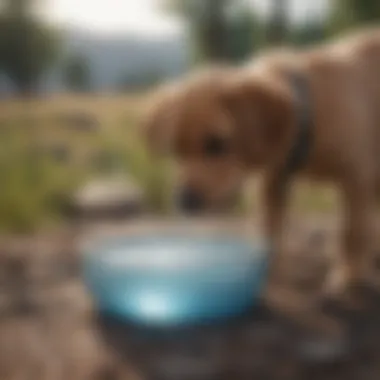Essential Dietary Tips for Puppies with Diarrhea


Intro
Puppy diarrhea can be a distressing situation for both pets and owners. Understanding the right approach to feeding your puppy during these times can play a significant role in their recovery. Dietary adjustments may help alleviate symptoms and provide necessary nutrition. This guide aims to detail food options and hydration strategies tailored for puppies experiencing diarrhea. Additionally, it will cover when to seek veterinary assistance and preventative measures for the future.
Understanding Your Pet
Breed Traits
Different dog breeds have unique digestive systems that may react differently to dietary changes. For example, smaller breeds often have faster metabolism, thus they can lose hydration quickly. Larger breeds might have a slower system but can also experience gastrointestinal issues.
Common Temperaments
A puppy's temperament can influence how they respond to dietary changes. Some puppies may be more sensitive to food changes, leading to increased stress which can exacerbate diarrhea. Understanding your puppy's normal eating habits can help recognize any disturbances sooner.
Special Needs
Some puppies have specific dietary requirements based on their health condition, age or breed. If your puppy has known allergies or sensitivities, it's crucial to consult a veterinarian before making any dietary adjustments.
Pet Care Essentials
Nutrition and Feeding Guidelines
When a puppy has diarrhea, a bland diet can help stabilize their stomach. Common options include:
- Boiled chicken (boneless and skinless)
- White rice or plain pasta
- Pumpkin (plain, canned)
- Plain yogurt (to help restore gut flora)
These foods tend to be easy on the digestive tract and can provide essential nutrients without further irritation.
Grooming Tips and Techniques
Maintaining proper hygiene is crucial for a puppy with diarrhea. Ensure regular grooming to prevent fecal matter from sticking to their fur. This includes:
- Regular dog baths
- Keeping the area around their rear clean
- Maintaining nail hygiene to avoid infections
Health and Wellness
A puppy’s health can deteriorate quickly with diarrhea. Monitoring for dehydration is crucial. Signs may include lethargy or dry gums. Offering frequent small amounts of fresh water is important. If diarrhea persists over 24 hours, seeking veterinary advice is a must.
When to Seek Veterinary Advice
If your puppy shows other concerning symptoms like blood in stool, vomiting, or signs of dehydration, consult a veterinarian immediately. These symptoms may indicate a more serious condition requiring professional attention.
Preventative Measures
To avoid future digestive disturbances, consider the following:
- Gradually transition your puppy to new foods
- Feed small amounts more frequently
- Monitor your puppy’s diet for any potential allergens
By taking these steps, you can help protect your puppy from ongoing gastrointestinal issues, ensuring they remain healthy and active.
Important: Always consult with a veterinarian before making significant changes to your puppy’s diet, especially during times of illness.
Understanding Puppy Diarrhea
Puppy diarrhea is a concern many pet owners face. Understanding its causes and implications is crucial for effective management. This section examines why it's important to grasp the concept of puppy diarrhea in relation to dietary considerations and recovery strategies. Recognizing the significance of underlying factors can aid in making informed decisions about your puppy's diet during this distressing time.
Common Causes of Diarrhea in Puppies
Puppies can experience diarrhea for various reasons. Identifying the root cause helps in selecting the right dietary approach to alleviate the problem.
Dietary changes
Dietary changes can often lead to gastrointestinal upset in puppies. Switching to a new food too quickly may cause diarrhea, as young dogs adapt to new ingredients. This aspect highlights the importance of introducing new foods gradually. The key feature of this cause is the sensitivity of a puppy's digestive system. A gradual transition allows the microflora in the gut to adjust, which is advantageous for overall digestive health. However, if not managed properly, sudden dietary changes can worsen diarrhea.
Infections
Infection is another common cause of diarrhea. Bacterial or viral infections can disrupt the normal gut flora, leading to increased bowel movements. This can result from exposure to sick animals or contaminated environments. Infections highlight the vulnerability of puppies to pathogens, especially those not yet vaccinated. The unique feature here is the potential severity of infections. Early identification can lead to timely veterinary intervention, which is crucial for recovery.


Parasites
Parasites can significantly contribute to diarrhea in puppies. Intestinal worms and protozoa can interfere with nutrient absorption, leading to digestive problems. This cause is particularly noteworthy as it indicates the importance of regular veterinary check-ups. A puppy with parasites may present other health complications, which can exacerbate diarrhea. Regular deworming is an essential preventative measure against this cause, underscoring the overall health management in young dogs.
Stress factors
Stress can also manifest as diarrhea in puppies. Changes in the environment, such as moving to a new home or introducing new pets, can trigger stress responses. This factor emphasizes the emotional aspect of a puppy's well-being. Recognizing stress-induced diarrhea is vital, as it differs from other causes. Addressing the stressor can help restore normal bowel function and improve the puppy’s overall health.
Food intolerances
Food intolerances present another potential cause of diarrhea. Some puppies may not tolerate certain ingredients well, leading to digestive upset. Identifying food intolerances involves careful observation of dietary habits and symptoms. The key characteristic of this issue is its varying nature; not all puppies react the same way to certain foods. Awareness of possible intolerances is essential for implementing effective dietary changes to support overall digestive health.
Identifying Symptoms
Understanding the symptoms of diarrhea is crucial for effective feeding decisions. Monitoring these signs helps in assessing severity and potential next steps.
Frequency of bowel movements
The frequency of bowel movements provides insight into the severity of diarrhea. A puppy experiencing increased frequency may indicate a more serious issue. Tracking this frequency helps pet owners understand the changes occurring in their puppy's digestive system. While occasional soft stools may not be alarming, consistent loose stools warrant closer examination and potentially dietary adjustments.
Consistency of stool
The consistency of stool is another key indicator of health. Watery stools suggest a significant problem, while slightly soft stools might not be as concerning. Monitoring consistency can aid in determining the current state of the puppy’s digestive health. Such observations can guide dietary choices, emphasizing the need for gentle and easily digestible foods during recovery.
Accompanying signs
Accompanying signs such as vomiting or lethargy significantly influence the decision-making process regarding feeding. If a puppy exhibits additional symptoms, it often indicates a need for urgent veterinary attention. Recognizing these signs ensures timely intervention, which may prevent further complications.
Duration of diarrhea
The duration of diarrhea is a vital aspect. If diarrhea lasts more than 24 hours, it may require immediate veterinary advice. Chronic diarrhea can lead to severe dehydration and other health issues, underscoring the need for urgent care. Continuous monitoring helps in making timely decisions about dietary changes and overall management strategies.
Behavioral changes
Changes in behaviour often accompany diarrhea. A puppy that seems less active or withdrawn may be dealing with discomfort or health issues. This characteristic highlights the interconnectedness of physical health and emotional well-being. Observing these changes can provide clues about the severity of the situation and help in determining the appropriate dietary measures.
Immediate Actions to Take
When a puppy experiences diarrhea, immediate actions are crucial. Promptly addressing the issue can prevent further complications and promote recovery. The first steps involve assessing hydration and creating a thoughtful feeding schedule. These actions are fundamental for the puppy's health and well-being. Proper hydration and nutrition play a vital role in managing diarrhea effectively.
Assessing Dehydration Risk
Signs of dehydration
Recognizing signs of dehydration in a puppy is the first step toward ensuring its health. Key characteristics include dry gums, excessive panting, and a noticeable loss of skin elasticity. These signs must be taken seriously. A dehydrated puppy can suffer from severe health issues. The unique aspect of this assessment is that it provides immediate insight into the puppy's condition. This makes monitoring hydration a beneficial practice during recovery.
Importance of hydration
Understanding the importance of hydration is vital. Water helps maintain essential body functions, particularly during digestive upsets. It is essential for flushing out toxins and supporting recovery. Focusing on hydration is a beneficial choice. Without adequate fluid intake, the puppy's health can deteriorate quickly. Moreover, maintaining hydration allows for easier digestion and nutrient absorption, aiding in a more rapid recovery.
Oral rehydration solutions
Utilizing oral rehydration solutions can be impactful. These solutions typically contain a balanced mix of electrolytes. They help replenish lost fluids and minerals, supporting rapid recovery. Oral rehydration solutions are effective during times of stress, as they encourage hydration without overtaxing the digestive system. However, it is essential to consult with a veterinarian before using these solutions, to ensure they are appropriate for the puppy's condition.
Establishing a Feeding Schedule
Creating a feeding schedule is equally crucial. Proper timing and portion size will support the puppy's recovery and help manage diarrhea. A well-structured feeding routine can minimize discomfort and improve gut health. This approach is essential for fostering a sense of stability for the puppy.
Frequency of feeding
Frequency of feeding should be adjusted when managing diarrhea. Smaller, frequent meals can ease the digestive burden. This strategy allows the puppy to process food better and absorb necessary nutrients. Frequent feeding is a popular approach, as it helps manage digestion without overwhelming the intestines. Ensuring regular intervals in feeding prepares the puppy's digestive system to recover and function as intended.
Portion control
Implementing portion control is another essential aspect. Smaller portions can prevent overwhelming the upset digestive system. This method promotes better absorption of nutrients, leading to a quicker recovery. Portion control is important, as it allows you to monitor how well the puppy is tolerating food. Adjusting the portion size based on the puppy's response can be a significant advantage during this time.
Monitoring intake
Monitoring intake of food and water is critical during recovery. Observing the puppy's appetite helps gauge how well it is handling its diet. If the puppy shows a reduction in appetite or increased discomfort, modifications may be necessary. Monitoring intake ensures you remain attentive to your puppy's needs. This vigilance allows for timely adjustments, ensuring your puppy remains nourished and adequately hydrated throughout its recovery period.


Recommended Foods for Puppies with Diarrhea
When dealing with a puppy that has diarrhea, choosing the right foods is essential. This part of the article focuses on how specific dietary choices can support recovery and maintain gastrointestinal health. Selective feeding can minimize discomfort and ensure that nutritional needs are still met, even during digestive disturbances. Understanding the options available can promote healing and provide comfort to the puppy.
Bland Diet Options
Boiled chicken and rice
Boiled chicken and rice is often recommended for puppies suffering from diarrhea. This dish is easily digestible and low in fiber, making it gentle on a puppy's stomach. The plain boiled chicken provides proteins that are crucial for recovery, whereas the rice serves as a binding agent.
Because of its simplicity, many pet owners opt for it during times of gastrointestinal stress. However, while it offers immediate relief, it is not nutritionally complete for long-term feeding. Therefore, once the puppy's condition improves, it's important to transition back to a balanced diet to meet all nutritional requirements.
Plain pumpkin
Plain pumpkin is another popular option that can help manage diarrhea. It contains soluble fiber that aids digestion and can normalize stool consistency. Pure pumpkin, not the spiced pie filling, provides important vitamins without added sugars or preservatives.
Its mild taste also makes it appealing for many puppies. However, it's essential to use it in moderation. Overloading on pumpkin can lead to other digestive issues, such as constipation. As a result, serving moderate amounts after confirming that the puppy tolerates it well is advisable.
Plain white bread
Plain white bread can be a source of carbohydrates and can sometimes ease diarrhea in puppies. Many pet owners use it as a temporary solution to help bulk up the stool.
Choosing plain white bread is crucial, as whole grain varieties may be more difficult for the puppy to digest. It's important to note, though, that white bread should not replace complete meals, and care should be taken not to incorporate any added ingredients that could complicate an upset stomach. While it can provide some relief, over-reliance may lead to nutritional imbalance.
Hydration Solutions
Water intake strategies
Maintaining proper hydration is critical for any puppy experiencing diarrhea. Effective water intake strategies can ensure the puppy stays hydrated. Offering fresh, clean water regularly is vital, as diarrhea can lead to rapid fluid loss.
Encouraging the puppy to drink small amounts frequently is preferable. If the puppy is reluctant to drink, adding a little flavor or offering water in different bowls can help stimulate interest. Staying attentive to hydration can accelerate recovery and reduce complications.
Electrolyte solutions
Electrolyte solutions designed for pets can be beneficial for puppies suffering from diarrhea. These solutions restore essential minerals lost in fluid, promoting balance within the body. Hydration mixes that are vet-approved can prove advantageous for puppies during recovery.
However, caregivers should not use human electrolyte drinks, as they may contain inappropriate levels of sodium or artificial ingredients. Always consult with a veterinarian before introducing any electrolyte solution to ensure suitability for a specific puppy.
Low-sodium broth
Low-sodium broth is another excellent way to encourage hydration while also providing some flavor. It can be an appealing option for a puppy that may not be inclined to drink water.
This broth can be served warm, making it more enticing. However, caregivers must ensure that it is free from onions, garlic, or other harmful ingredients. While providing hydration is the primary goal, low-sodium broth does not substitute a balanced diet. It is meant to supplement hydration and foster recovery.
Commercial Diets for Gastrointestinal Upsets
A vet-recommended puppy formula
A vet-recommended puppy formula can be an excellent choice for managing gastrointestinal upset. These specialized diets are formulated to meet the nutritional needs of recovering puppies. They often contain easily digestible ingredients and added probiotics to support gut health.
While these are beneficial during recovery, pet owners should consult with a veterinarian to determine the most appropriate formula for their puppy. These diets can be more expensive than regular dog food, but they are advisable for quick recovery.
Diet specific to diarrhea
Many brands create diets specifically for dogs with diarrhea. These options include unique blends that promote firm stool and healthy digestion. The ingredients are typically low in fiber and may contain added nutrients to support recovery.
Selecting a diet specific to diarrhea can streamline the recovery process. Still, owners should transition carefully to avoid upset stomach during the switch. Consulting with a vet on suitable brands is recommended to ensure quality and effectiveness.
Treat alternatives to avoid
While it can be tempting to give puppies treats during recovery, some options should be avoided. Fatty treats, high-fiber snacks, or human foods can complicate diarrhea. Instead, caregivers should focus on hydration and bland diets until the puppy recovers.
Ensuring that treats are minimal and safe is essential. Ideally, those recovering from diarrhea should stick to either bland foods or specially formulated diets until they regain full health. This helps maintain their recovery without unexpected setbacks.
Remember, always monitor your puppy closely during recovery and consult with a veterinarian if diarrhea persists.
Monitoring Your Puppy’s Recovery


Monitoring your puppy’s recovery from diarrhea is quite essential. It helps you gauge the effectiveness of the dietary changes you have implemented and allows you to observe any significant shifts in their health status. Keeping a close eye on various recovery signs not only aids in ensuring that your puppy is on the right path but also helps you identify if something more serious requires attention.
When a puppy experiences diarrhea, several changes can occur in their body. These changes can affect their energy levels, eating habits, and overall behavior. Understanding these nuances promotes a more informed approach to managing recovery and can provide peace of mind during a stressful time.
Signs of Improvement
Normalization of stool
Normalization of stool is a key indicator that your puppy is recovering from diarrhea. A return to regular, firm stool signifies that their digestive system is regaining stability. It is important to observe the consistency of the stool during this period. A healthy dog stool should be well-formed without any signs of liquid or mucus. Moreover, a notable charactristic of normalized stool is its color, which should be brown and consistent with what's expected for your puppy's diet.
The benefit of monitoring stool normalization lies in the insights it offers regarding dietary choices. If the stool remains abnormal despite dietary adjustments, it may suggest that further evaluation is necessary. In this context, normalization of stool reflects an effective recovery strategy.
Increased energy levels
Increased energy levels are another crucial indicator of recovery. When a puppy’s health is compromised, lethargy is common. If you notice a marked improvement in your puppy’s playfulness, curiosity, and overall activity, it often indicates that their body is bouncing back. The key characteristic of increased energy levels is engagement in their usual activities, such as playing, exploring, or interacting with family members.
This positive change not only elevates the puppy's mood but also prompts their appetite to return. Increased energy can also be a valuable sign that suggests that the body is overcoming the causes of diarrhea. However, if the energy levels remain low, you might need to consider further evaluation.
Regular appetite
Regular appetite is a significant sign of recovery in puppies. Returning to their usual eating habits suggests that the stomach is settling down. When puppies experience gastrointestinal distress, a lack of appetite often manifests. Observing your puppy eagerly eating their recommended recovery meals reflects a step towards better health. A key characteristic of a regular appetite is the enthusiastic yet controlled eating, as this shows comfort with the food provided.
The advantage of monitoring appetite closely is that it can guide you in recognizing other underlying issues quickly. If your puppy is still disinterested in food after a few days, it may merit a consultation with a veterinary professional. In essence, a return to a healthy appetite is fundamental for nurturing your puppy back to vigor.
When to Consult a Veterinary Professional
Prolonged diarrhea
Prolonged diarrhea can become a serious concern. If your puppy shows diarrhea lasting beyond a couple of days, it is important to act. Persistent diarrhea might lead to significant dehydration and nutritional deficiencies. The key characteristic of prolonged diarrhea is its resilience against standard dietary interventions. If dietary changes do not yield improvement within a reasonable time frame, this aspect becomes a valid reason to consult a veterinary professional.
Taking swift action when faced with prolonged diarrhea can prevent more severe complications. By being vigilant, you can ensure timely treatment, which is essential for your puppy’s recovery.
Severe lethargy
Severe lethargy is an alarming sign that requires immediate attention. When a pet exhibits a sudden decrease in energy alongside other symptoms, it might indicate a deeper health issue. The key characteristic of severe lethargy is an obvious lack of responsiveness and engagement with their environment. This may occur in addition to other health markers like low appetite or signs of dehydration.
Recognizing severe lethargy is vital as it disrupts the recovery process. If your puppy shows these symptoms, consulting with a veterinarian is essential for proper diagnostics and treatment plans.
Additional concerning symptoms
Monitoring for additional concerning symptoms can be very useful in assessing a puppy's health situation. Some common symptoms to watch for include vomiting, fever, or blood in the stool. These indicators can provide crucial information about the nature of your puppy's condition. The key characteristic of additional concerning symptoms is their potential to indicate more severe health issues, which could escalate if left unnoticed.
In summary, being attentive to your puppy’s health, recovery signs, and any changes is crucial. It will empower you to make informed decisions and seek professional help when necessary. Keeping these points in mind will contribute toward maintaining your puppy's overall well-being.
Long-Term Digestive Health Management
Managing a puppy’s gastrointestinal health goes beyond addressing immediate concerns. It involves a dedicated focus on long-term digestive health management. This approach helps to prevent future episodes of diarrhea and promotes overall well-being. Adopting appropriate dietary practices contributes to a stable gut environment. This stability is essential for improved nutrient absorption and a robust immune system.
Preventative Dietary Measures
Gradual food transitions
Transitioning a puppy's diet should be done slowly and carefully. A gradual approach allows the puppy's digestive system to adjust to new foods. This method can prevent potential gastrointestinal upset. By mixing small amounts of the new food with the current food over several days, owners can minimize disruptions. This slow integration is a beneficial choice as it reduces the risk of diarrhea related to sudden dietary changes. The key characteristic of this method is its ability to ease the pup into new dietary habits.
Balanced nutrition principles
Maintaining balanced nutrition principles is crucial for a puppy's digestive health. A diet that balances proteins, carbohydrates, fats, vitamins, and minerals supports growth and energy levels. It is a popular strategy as it promotes consistent health and can avert issues related to deficiencies or excesses. The unique feature here is the commitment to a well-rounded diet. By adhering to these principles, pet owners can enhance their puppy’s resilience against digestive disturbances.
Regular feeding routine
Establishing a regular feeding routine is another key aspect of long-term management. This practice helps in regulating digestion and promotes routine bowel movements. A consistent schedule of feeding encourages predictable digestive patterns. It is advantageous as it provides structure to the puppy’s day. Moreover, it helps in monitoring food intake, making it easier to identify any changes that may signal health issues. The characteristic feature of this routine is its role in fostering digestive regularity.
Recognizing and Managing Food Allergies
Identifying allergens
Identifying allergens is critical in managing gastrointestinal health. Many puppies suffer from food allergies that can lead to diarrhea. By observing reactions to specific foods, owners can pinpoint problematic ingredients. This focus on allergen identification is important as it paves the way for healthier dietary choices. The unique feature is the emphasis on attentiveness to subtle signs, which can lead to meaningful improvements.
Elimination diets
Elimination diets play a significant role in recognizing food sensitivities. This method involves removing potential allergens from the puppy's diet and reintroducing them one at a time. The aim is to identify which food causes distress. It is an effective approach as it allows for controlled testing of food responses. However, it requires careful management and attention to ensure balanced nutrition during the process.
Consulting with veterinary nutritionists
Consulting with veterinary nutritionists offers valuable insight into managing your puppy’s diet. These professionals can provide tailored advice based on the puppy's specific needs and health history. The guidance received is beneficial, helping investors to navigate complex dietary challenges. Unique feature lies in the expertise provided, which can significantly simplify the management of food-related issues. This consultation can be a wise step towards achieving optimal health outcomes for your puppy.



